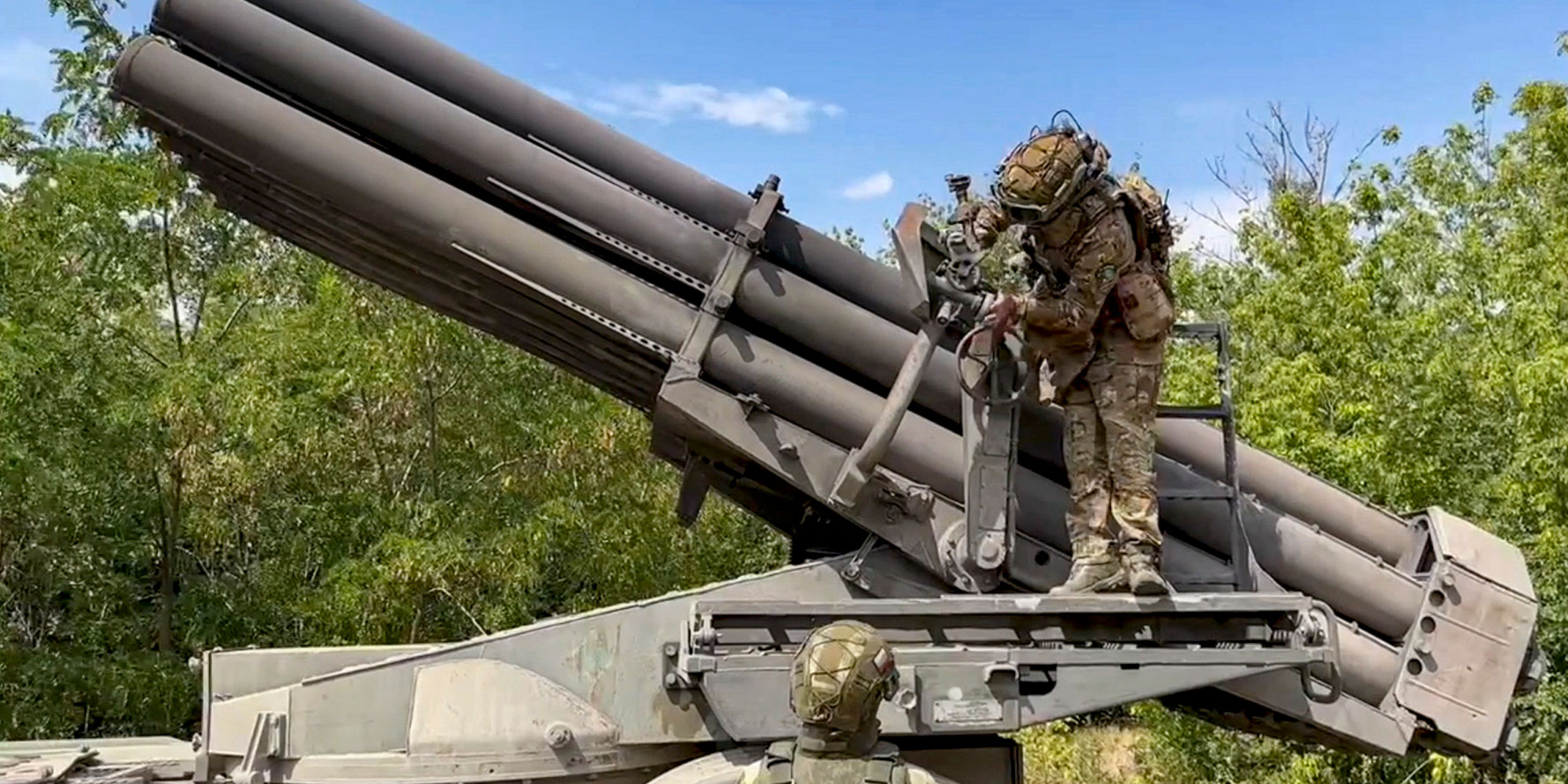Catch me up. How did this all start?
News24 first reported on the 17 South African men who were allegedly duped into fighting for Russia in Ukraine’s war-torn Donbas region about two weeks ago.
The men were lured into fighting under the pretext of “bodyguard training” in Russia allegedly by former president Jacob Zuma’s daughter, Duduzile Zuma-Sambudla, and others associated with the uMkhonto Wesizwe (MK) party, according to the publication. Zuma-Sambudla, a man named Blessing Khoza and a woman named Siphokazi Xuma-Zuma allegedly persuaded the men to sign contracts written in Russian, which they did not understand, and which forced them to fight in the war in Ukraine.
Enter Nkosazana Bongamini Zuma-Mncube, a daughter of Zuma’s, and Zuma-Sambudla’s half-sister. Zuma-Mncube has now accused Zuma-Sambudla of trafficking the men — eight of whom are her family members — to Russia for mercenary training.
In a statement on 22 November 2025, Zuma-Mncube said: “These men were lured to Russia under false pretences and handed to a Russian mercenary group, Wagner, to fight in the Ukraine war without their knowledge or consent.” She’s laid charges of contravening the Prevention and Combating of Trafficking in Persons Act 7 of 2013 and the Regulation of Foreign Military Assistant Act (RFMAA) 15 of 1998, as well as the Common Law Act of Fraud against Zuma-Sambudla.
The Hawks have confirmed that an investigation into Zuma-Sambudla is underway.
Zuma-Sambudla has now claimed she was duped into recruiting the men for what she believed was legitimate training, and has filed a fraud case against a fellow recruiter, reported News24.
In a shock announcement on Friday morning, MK party chairperson Nathi Nhleko said Zuma-Sambudla would resign as one of the party’s MPs in Parliament.
Meanwhile, President Cyril Ramaphosa has ordered an investigation into the circumstances that led to the recruitment of these men into “seemingly mercenary activities”.
Are South Africans allowed to fight in foreign wars or militaries?
No. Section 198(b) of South Africa’s Constitution precludes South African citizens from getting involved in any foreign armed conflict. The Regulation of Foreign Military Assistant Act (RFMAA) 15 of 1998, makes it clear that: “No person may within the Republic or elsewhere recruit, use or train persons for or finance or engage in mercenary activity.”
The act explicitly bars South African citizens from rendering any foreign military assistance without the permission of the National Conventional Arms Control Committee, which regulates the country’s arms transfers.
In terms of the act, foreign military assistance is broadly defined as:
“Military services or military-related services, or any attempt, encouragement, incitement or solicitation to render such services, in the form of —
- (a) military assistance to a party to the armed conflict by means of —
- (i) advice or training;
- (ii) personnel, financial, logistical, intelligence or operational support;
- (iii) personnel recruitment;
- (iv) medical or para-medical services; or
- (v) procurement of equipment;
- (b) security services for the protection of individuals involved in armed conflict or their property;
- (c) any action aimed at overthrowing a government or undermining the constitutional order, sovereignty or territorial integrity of a state;
- (d) any other action that has the result of furthering the military interests of a party to the armed conflict, but not humanitarian or civilian activities aimed at relieving the plight of civilians in an area of armed conflict.”
Professor of Criminal and Military Law and the Law of Armed Conflict at Stellenbosch University’s Faculty of Military Science, Dr Michelle Nel, told Daily Maverick that the act was “quite wide” in terms of what it considers to be foreign military assistance.
“What we would normally [consider] as mercenary action is, for example, to go and fight and get paid for it,” said Nel. “But the act refers to any assistance given to a party to the armed conflict — which then refers to advice or training; personnel or financial; logistics; intelligence; recruitment; medical or para-medical services; procurement of equipment. Anything like that is actually legislated and [prohibited].
“It’s kind of a blanket ban unless you have permission from the National Conventional Arms Control Committee,” she added.
The RFMAA is intended to be repealed by the Prohibition of Mercenary Activities and Regulations of Certain Activities in Country of Armed Conflict Act, of 2006. But this act is yet to be promulgated, according to Nel.
Nel says the Prohibition of Mercenary Activities Act is even “stricter” than the Regulation of Foreign Military Assistance Act of 1998. It goes as far as prohibiting any South African humanitarian organisation from providing humanitarian assistance in a country of armed conflict, unless such organisation is registered with the National Conventional Arms Control Committee for that purpose.
What are the penalties for contravening the act?
Penalties for contravening the 1998 Regulation of Foreign Military Assistance Act include a fine or imprisonment, or both.
The act itself doesn’t specify the amount of the fine or the length of imprisonment, but Nel says it would probably depend on the jurisdiction of the court and, of course, the seriousness of the offence.
“The judge will use their discretion to determine what kind of punishment. But you are looking at a fine or, at worst, imprisonment,” she said.
So could these South Africans fighting for Russia in Ukraine face prosecution?
Great question, and one of many to which we do not have a direct answer.
National Prosecuting Authority (NPA) spokesperson Bulelwa Makeke told Daily Maverick that, “yes” — the men can indeed be charged under the Regulation of Foreign Military Assistance Act if it can be proven that they “went there knowingly and intentionally”.
It is ostensibly already a challenge for the NPA to successfully prosecute someone for contravening the act (more on this later). If the men were, in fact, duped as they claim, it could be even more difficult for the NPA to achieve a successful prosecution, says Nel.
“In terms of this legislation, my reading of it would be that, you must’ve had the intention to render military assistance,” said Nel. She explained that if it was never their intention to render military assistance — “if it’s true and they really didn’t know” — in terms of criminal law, the NPA is not going to be able to prove the mens rea (the intent element of an offence) that is necessary.
What about Duduzile?
Nel told Daily Maverick that if it can be proven that Zuma-Sambudla, Khoza and/or Xuma-Zuma were responsible for recruiting the men and sending them to Russia and eventually to Ukraine, they could be charged under the act.
This is because the Regulation of Foreign Military Assistance Act is clear that no South African citizen may “recruit, use or train” persons for mercenary activities.
“Once again, it [the law] requires that she [ Zuma-Sambudla] would’ve had knowledge — in terms of intent — to do this… I think of everybody involved, she’s probably the most likely, if there’s going to be a prosecution, to be prosecuted for this,” said Nel.
Have there ever been any prosecutions of South Africans fighting in foreign wars?
It’s complicated.
According to Makeke: “So far, there are no prosecutions in terms of this legislation.”
Nel also wrote in The Conversation last year that, despite the many South Africans who continue to fight in foreign wars, the NPA “has not succeeded in prosecuting any. Some cases have been settled by way of plea bargain, with fines and suspended prison sentences.”
However, there are some examples of prosecutions we can find. But prosecutions under the 1998 act are few and far between, and usually involve plea bargains and minimal sentencing.
So why is it so difficult to get a prosecution in terms of the act?
Makeke said that investigations under the Regulation of Foreign Military Assistance Act “take time and always” hinge on the cooperation of foreign countries.
“Challenges are [typical] with investigations, including lack of cooperation from foreign countries and insufficient evidence for prosecution,” she told Daily Maverick.
But aren’t there South Africans fighting in other wars?
Yes, many South African citizens continue to fight in foreign militaries and private military contractors.
There are numerous reports of South African citizens who are serving in the Israeli Defence Force (IDF). (Read here and here). The government has warned them that any South African citizen who has joined the IDF “without the necessary permission of the National Conventional Arms Control Committee is breaking the law and can be prosecuted”.
However, there has yet to be a prosecution in these matters.
Read more: Where are the prosecutions of South Africans fighting in the Israel Defence Forces?
Makeke told Daily Maverick that “the IDF-related cases are under investigation”, and advised us to approach the Hawks for an update on the investigations. According to Hawks spokesperson, Brigadier Nomthandazo Mbambo, investigations into the IDF-related matters “is still ongoing”. DM





 An image captured from a video provided by the Russian Defence Ministry shows a crew preparing to launch a rocket from their Uragan multiple launch rocket system in South Donetsk, Ukraine, on 11 August 2024. (Photo: Russian Defence Ministry Press Service / EPA-EFE)
An image captured from a video provided by the Russian Defence Ministry shows a crew preparing to launch a rocket from their Uragan multiple launch rocket system in South Donetsk, Ukraine, on 11 August 2024. (Photo: Russian Defence Ministry Press Service / EPA-EFE)